
7 April 2025
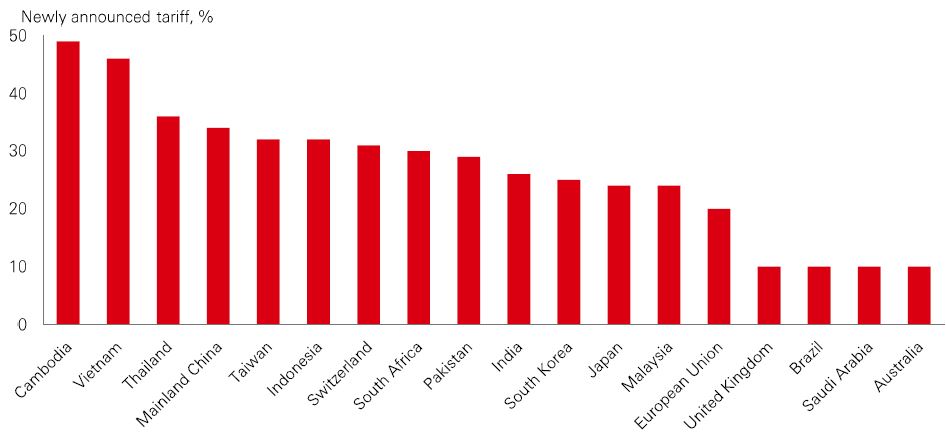
Investors had been steeling themselves for “liberation day”. But after last week’s tariff announcement, what happens next in investment markets?
Overall, the tariffs, any policy retaliation, and the economic consequences could significantly impact market dynamics. Policy uncertainty is now structurally elevated, partly because investors can’t be sure where tariffs will finally settle. And while recent hard data on GDP and profits have held up, a difficult mix of policy uncertainty, stagflation-lite news, and lower profits expectations, means that investor confidence could falter. In turn, sticky inflation postpones a pre-emptive easing by the Fed, which could have acted as a stock market shock absorber.
There are questions now about whether rest-of-the-world stocks can still outperform. After all, history suggests that when the US economy sneezes, the rest of the world catches a cold. But new domestic policy initiatives, especially in Europe and China, could support stock market performance. Likewise, US dollar weakness could act as a stimulus for the rest-of-the-world stocks. Plus, there could be relative winners from last week’s announcement.
The base case of ‘spinning around’ has envisaged policy uncertainty driving volatility this year. But if tariffs are fully implemented, a second scenario where growth and profits ‘topple over’ could come more vividly into play. High policy uncertainty continues to point to an agile approach to managing portfolios, meaning diversification and a selective approach that build resilience across geographies, asset classes and factors.
Private credit dealmaking enjoyed a pick-up in momentum in the final quarter of last year, outpacing levels seen in Q3, according to the latest data. Much of the activity was driven by refinancings and add-on financings to support company growth. M&A activity also rose modestly in late 2024, aided by improving equity valuations and record levels of private equity ‘dry powder’ (funds waiting to be deployed), although sponsor-backed M&A was below historical peaks.
Spreads remained under pressure but appeared to stabilise during Q4, following a modest tightening earlier in the year. Higher base rates kept all-in yields (in USD) in the low double digits for many direct lending deals. Meanwhile, default rates edged up slightly from Q3 but remain below historical averages.
Looking ahead, some private credit investment specialists note that demand remains strong as investors seek higher yields and stable income, even in a ‘higher for longer’ rate environment. And spreads continue to offer a premium over public markets. Overall, they believe that experienced managers with flexible strategies, prudent underwriting and active portfolio monitoring should continue to capture attractive risk-adjusted returns.
The value of investments and any income from them can go down as well as up and investors may not get back the amount originally invested. Past performance does not predict future returns. The level of yield is not guaranteed and may rise or fall in the future. For informational purposes only and should not be construed as a recommendation to invest in the specific country, product, strategy, sector, or security Any views expressed were held at the time of preparation and are subject to change without notice. Any forecast, projection or target where provided is indicative only and is not guaranteed in any way. HSBC Asset Management. Macrobond, Bloomberg, The White House. Data as at 7.30am UK time 04 April 2025.
In a number of EM bond markets, valuations are attractive with real yields considerably above historical medians, and with positive term premia. Gradual disinflation should mean many EM central banks can continue to ease policy, with some like India, Colombia, and the Czech Republic easing at a faster pace. Plus, while trade tariffs are often viewed as potentially inflationary in EM, they may actually be disinflationary in some countries by causing a supply glut in goods production. |
EM currencies, on the other hand, remain a tricky call. In 2024, hedging EM local-currency exposure boosted total returns as the US dollar made gains. Despite this year’s recovery in EM FX, currencies could remain volatile as policy uncertainty persists, with the US dollar playbook looking increasingly unpredictable.
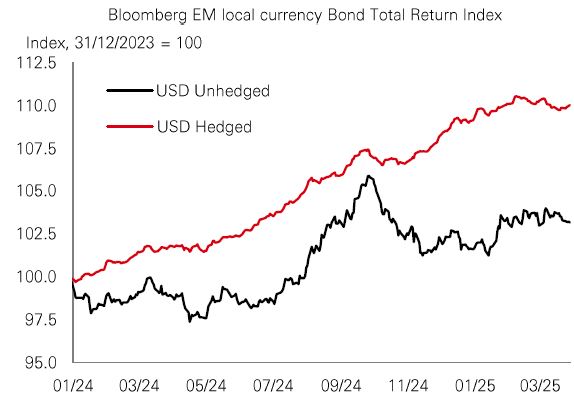
Further out, analysts are expecting year-on-year profit growth of around 11% this year, down from expectations of 14% at the start of 2025 but still above long-run averages. Cooling optimism about the consumer has resulted in the expected share of profit growth from the consumer discretionary and staples sectors halving from their contribution levels last year. But the profit contribution from technology is still going strong – and expected to rise again in 2025. These high expectations could leave both tech stocks and the wider market vulnerable to disappointment. With earnings season arriving amid extreme world policy uncertainty, investors should prepare for surprises.
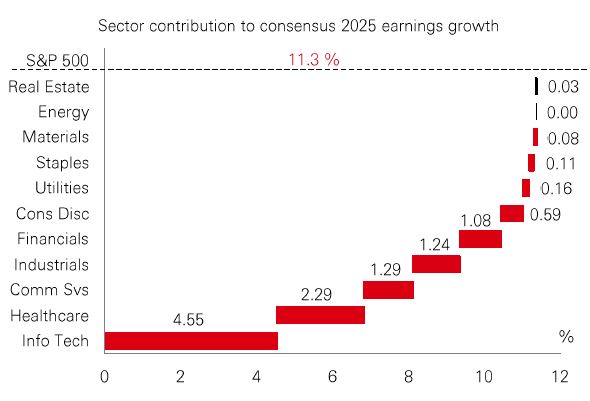
For those celebrating Easter this year, the ritual of hard-boiling and decorating eggs and gifting chocolate Easter eggs will be a significantly more expensive affair than in 2024. Both egg and cocoa prices have surged over recent months, as H5 strains of avian influenza have decimated the egg-laying hen population, and cocoa production in Ghana and the Ivory Coast – accounting for around 60% of global supply – has been hit by poor weather conditions. In Ghana, an outbreak of Swollen shoot disease, and mining and smuggling have also weighed on output. |
Climate change probably explains some of these disruptions. Industry experts have blamed record warm ocean temperatures for contributing to excessive rainfall in West Africa. And some studies have claimed the spread of Avian flu has been exacerbated by new patterns of seasonal bird migrations. Higher egg and chocolate prices are clearly not a big deal for the consumer outlook – eggs account for just 0.2% of the US CPI basket. But they are a stark reminder that we are living in a more volatile inflation regime versus the 2010s, with extreme weather, rising trade protectionism, supply chain rerouting, and active fiscal policy all playing their part in this story.
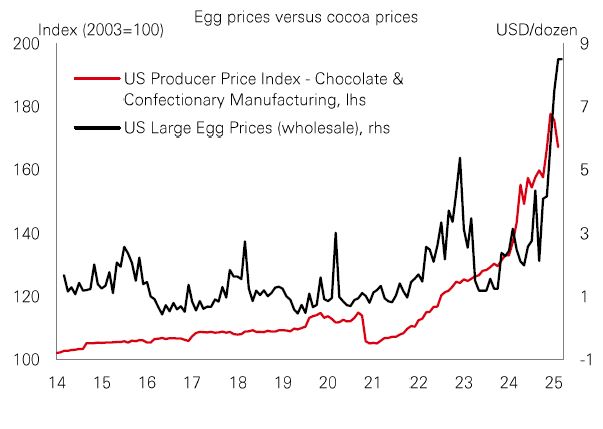
Past performance does not predict future returns. The level of yield is not guaranteed and may rise or fall in the future. For informational purposes only and should not be construed as a recommendation to invest in the specific country, product, strategy, sector, or security Any views expressed were held at the time of preparation and are subject to change without notice. Index returns assume reinvestment of all distributions and do not reflect fees or expenses. You cannot invest directly in an index. Any forecast, projection or target where provided is indicative only and is not guaranteed in any way. Source: HSBC Asset Management. Macrobond, Bloomberg, Datastream. Data as at 7.30am UK time 04 April 2025.

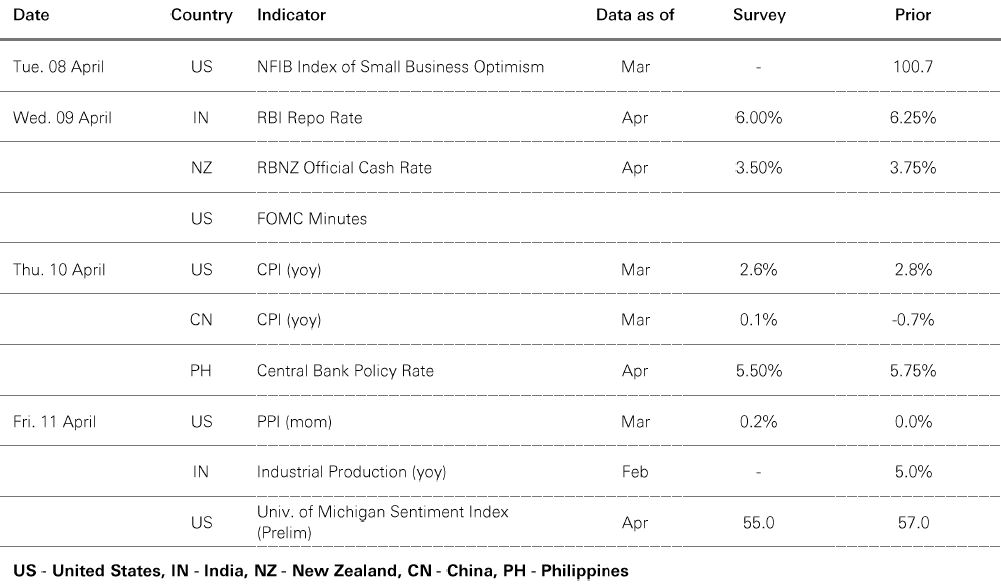
Source: HSBC Asset Management. Data as at 7.30am UK time 04 April 2025. For informational purposes only and should not be construed as a recommendation to invest in the specific country, product, strategy, sector or security. Any views expressed were held at the time of preparation and are subject to change without notice.
Heightened global trade uncertainty weighed on risk markets, with the US DXY dollar index on the defensive. Oil prices declined on rising global demand concerns, and gold consolidated after recent gains. Core government bonds rallied, led by US Treasuries. The front-end of the US yield curve is factoring in 3-4 Fed rate cuts over the next 12 months. New data showed more weakness in US consumer confidence. US credit spreads widened, with IG outperforming HY. US equities saw broad-based falls amid weakening 2025 earnings expectations. The Euro Stoxx 50 index declined on rising eurozone growth concerns. Japan’s Nikkei 225 dropped markedly, with lower JGB yields weighing on financials. EM Asia stock markets posted losses, led by South Korea’s tech-dominant Kospi index. The Hang Seng, Shanghai Composite and India’s Sensex indices all declined. Latin American equities were resilient.






This document or video is prepared by The Hongkong and Shanghai Banking Corporation Limited (‘HBAP’), 1 Queen’s Road Central, Hong Kong. HBAP is incorporated in Hong Kong and is part of the HSBC Group. This document or video is distributed and/or made available, HSBC Bank (China) Company Limited, HSBC Bank (Singapore) Limited, HSBC Bank Middle East Limited (UAE), HSBC UK Bank Plc, HSBC Bank Malaysia Berhad (198401015221 (127776-V))/HSBC Amanah Malaysia Berhad (20080100642 1 (807705-X)), HSBC Bank (Taiwan) Limited, HSBC Bank plc, Jersey Branch, HSBC Bank plc, Guernsey Branch, HSBC Bank plc in the Isle of Man, HSBC Continental Europe, Greece, The Hongkong and Shanghai Banking Corporation Limited, India (HSBC India), HSBC Bank (Vietnam) Limited, PT Bank HSBC Indonesia (HBID), HSBC Bank (Uruguay) S.A. (HSBC Uruguay is authorised and oversought by Banco Central del Uruguay), HBAP Sri Lanka Branch, The Hongkong and Shanghai Banking Corporation Limited – Philippine Branch, HSBC Investment and Insurance Brokerage, Philippines Inc, and HSBC FinTech Services (Shanghai) Company Limited and HSBC Mexico, S.A. Multiple Banking Institution HSBC Financial Group (collectively, the “Distributors”) to their respective clients. This document or video is for general circulation and information purposes only.
The contents of this document or video may not be reproduced or further distributed to any person or entity, whether in whole or in part, for any purpose. This document or video must not be distributed in any jurisdiction where its distribution is unlawful. All non-authorised reproduction or use of this document or video will be the responsibility of the user and may lead to legal proceedings. The material contained in this document or video is for general information purposes only and does not constitute investment research or advice or a recommendation to buy or sell investments. Some of the statements contained in this document or video may be considered forward looking statements which provide current expectations or forecasts of future events. Such forward looking statements are not guarantees of future performance or events and involve risks and uncertainties. Actual results may differ materially from those described in such forward-looking statements as a result of various factors. HBAP and the Distributors do not undertake any obligation to update the forward-looking statements contained herein, or to update the reasons why actual results could differ from those projected in the forward-looking statements. This document or video has no contractual value and is not by any means intended as a solicitation, nor a recommendation for the purchase or sale of any financial instrument in any jurisdiction in which such an offer is not lawful. The views and opinions expressed are based on the HSBC Global Investment Committee at the time of preparation and are subject to change at any time. These views may not necessarily indicate HSBC Asset Management‘s current portfolios’ composition. Individual portfolios managed by HSBC Asset Management primarily reflect individual clients’ objectives, risk preferences, time horizon, and market liquidity.
The value of investments and the income from them can go down as well as up and investors may not get back the amount originally invested. Past performance contained in this document or video is not a reliable indicator of future performance whilst any forecasts, projections and simulations contained herein should not be relied upon as an indication of future results. Where overseas investments are held the rate of currency exchange may cause the value of such investments to go down as well as up. Investments in emerging markets are by their nature higher risk and potentially more volatile than those inherent in some established markets. Economies in emerging markets generally are heavily dependent upon international trade and, accordingly, have been and may continue to be affected adversely by trade barriers, exchange controls, managed adjustments in relative currency values and other protectionist measures imposed or negotiated by the countries with which they trade. These economies also have been and may continue to be affected adversely by economic conditions in the countries in which they trade. Investments are subject to market risks, read all investment related documents carefully.
This document or video provides a high-level overview of the recent economic environment and has been prepared for information purposes only. The views presented are those of HBAP and are based on HBAP’s global views and may not necessarily align with the Distributors’ local views. It has not been prepared in accordance with legal requirements designed to promote the independence of investment research and is not subject to any prohibition on dealing ahead of its dissemination. It is not intended to provide and should not be relied on for accounting, legal or tax advice. Before you make any investment decision, you may wish to consult an independent financial adviser. In the event that you choose not to seek advice from a financial adviser, you should carefully consider whether the investment product is suitable for you. You are advised to obtain appropriate professional advice where necessary.
The accuracy and/or completeness of any third-party information obtained from sources which we believe to be reliable might have not been independently verified, hence Customer must seek from several sources prior to making investment decision.
The following statement is only applicable to HSBC Mexico, S.A. Multiple Banking Institution HSBC Financial Group with regard to how the publication is distributed to its customers: This publication is distributed by Wealth Insights of HSBC México, and its objective is for informational purposes only and should not be interpreted as an offer or invitation to buy or sell any security related to financial instruments, investments or other financial product. This communication is not intended to contain an exhaustive description of the considerations that may be important in making a decision to make any change and/or modification to any product, and what is contained or reflected in this report does not constitute, and is not intended to constitute, nor should it be construed as advice, investment advice or a recommendation, offer or solicitation to buy or sell any service, product, security, merchandise, currency or any other asset.
Receiving parties should not consider this document as a substitute for their own judgment. The past performance of the securities or financial instruments mentioned herein is not necessarily indicative of future results. All information, as well as prices indicated, are subject to change without prior notice; Wealth Insights of HSBC Mexico is not obliged to update or keep it current or to give any notification in the event that the information presented here undergoes any update or change. The securities and investment products described herein may not be suitable for sale in all jurisdictions or may not be suitable for some categories of investors.
The information contained in this communication is derived from a variety of sources deemed reliable; however, its accuracy or completeness cannot be guaranteed. HSBC México will not be responsible for any loss or damage of any kind that may arise from transmission errors, inaccuracies, omissions, changes in market factors or conditions, or any other circumstance beyond the control of HSBC. Different HSBC legal entities may carry out distribution of Wealth Insights internationally in accordance with local regulatory requirements.
Important Information about the Hongkong and Shanghai Banking Corporation Limited, India (“HSBC India”)
HSBC India is a branch of The Hongkong and Shanghai Banking Corporation Limited. HSBC India is a distributor of mutual funds and referrer of investment products from third party entities registered and regulated in India. HSBC India does not distribute investment products to those persons who are either the citizens or residents of United States of America (USA), Canada or New Zealand or any other jurisdiction where such distribution would be contrary to law or regulation.
The following statement is only applicable to HSBC Bank (Taiwan) Limited with regard to how the publication is distributed to its customers: HSBC Bank (Taiwan) Limited (“the Bank”) shall fulfill the fiduciary duty act as a reasonable person once in exercising offering/conducting ordinary care in offering trust services/ business. However, the Bank disclaims any guarantee on the management or operation performance of the trust business.
The following statement is only applicable to PT Bank HSBC Indonesia (“HBID”): PT Bank HSBC Indonesia (“HBID”) is licensed and supervised by Indonesia Financial Services Authority (“OJK”). Customer must understand that historical performance does not guarantee future performance. Investment product that are offered in HBID is third party products, HBID is a selling agent for third party product such as Mutual Fund and Bonds. HBID and HSBC Group (HSBC Holdings Plc and its subsidiaries and associates company or any of its branches) does not guarantee the underlying investment, principal or return on customer investment. Investment in Mutual Funds and Bonds is not covered by the deposit insurance program of the Indonesian Deposit Insurance Corporation (LPS).
Important information on ESG and sustainable investing
Today we finance a number of industries that significantly contribute to greenhouse gas emissions. We have a strategy to help our customers to reduce their emissions and to reduce our own. For more information visit www.hsbc.com/sustainability.
In broad terms “ESG and sustainable investing” products include investment approaches or instruments which consider environmental, social, governance and/or other sustainability factors to varying degrees. Certain instruments we classify as sustainable may be in the process of changing to deliver sustainability outcomes. There is no guarantee that ESG and Sustainable investing products will produce returns similar to those which don’t consider these factors. ESG and Sustainable investing products may diverge from traditional market benchmarks. In addition, there is no standard definition of, or measurement criteria for, ESG and Sustainable investing or the impact of ESG and Sustainable investing products. ESG and Sustainable investing and related impact measurement criteria are (a) highly subjective and (b) may vary significantly across and within sectors.
HSBC may rely on measurement criteria devised and reported by third party providers or issuers. HSBC does not always conduct its own specific due diligence in relation to measurement criteria. There is no guarantee: (a) that the nature of the ESG / sustainability impact or measurement criteria of an investment will be aligned with any particular investor’s sustainability goals; or (b) that the stated level or target level of ESG / sustainability impact will be achieved. ESG and Sustainable investing is an evolving area and new regulations are being developed which will affect how investments can be categorised or labelled. An investment which is considered to fulfil sustainable criteria today may not meet those criteria at some point in the future.
THE CONTENTS OF THIS DOCUMENT OR VIDEO HAVE NOT BEEN REVIEWED BY ANY REGULATORY AUTHORITY IN HONG KONG OR ANY OTHER JURISDICTION. YOU ARE ADVISED TO EXERCISE CAUTION IN RELATION TO THE INVESTMENT AND THIS DOCUMENT OR VIDEO. IF YOU ARE IN DOUBT ABOUT ANY OF THE CONTENTS OF THIS DOCUMENT OR VIDEO, YOU SHOULD OBTAIN INDEPENDENT PROFESSIONAL ADVICE.
© Copyright 2025. The Hongkong and Shanghai Banking Corporation Limited, ALL RIGHTS RESERVED.
No part of this document or video may be reproduced, stored in a retrieval system, or transmitted, on any form or by any means, electronic, mechanical, photocopying, recording or otherwise, without the prior written permission of The Hongkong and Shanghai Banking Corporation Limited.